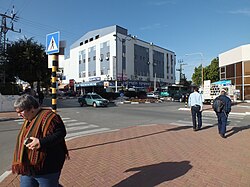Kiryat Malakhi
Kiryat Mal'akhi
|
||
|---|---|---|
| Hebrew transcription(s) | ||
| • ISO 259 | Qiryat Malˀaki | |
| • Also spelled | Qiryat Mal'akhi (official) Kiryat Malachi (unofficial) |
|
 |
||
|
||
| Coordinates: 31°44′N 34°44′E / 31.733°N 34.733°ECoordinates: 31°44′N 34°44′E / 31.733°N 34.733°E | ||
| District | Southern | |
| Founded | 1951 | |
| Government | ||
| • Type | City (from 1998) | |
| • Mayor | Eliyahu Zohar | |
| Area | ||
| • Total | 4,632 dunams (4.632 km2 or 1.788 sq mi) | |
| Population (2015) | ||
| • Total | 21,551 | |
| Name meaning | City of Angels | |
Kiryat Malakhi (Hebrew: קִרְיַת מַלְאָכִי, also Qiryat Malakhi or Kiryat Malachi) is a city in the Southern District of Israel, 17 kilometres (11 mi) from Ashkelon. In 2015 it had a population of 21,551. Its jurisdiction is 4,632 dunams (~4.6 km²).
Kiryat Malakhi, literally "City of Angels", was established in 1951 as a ma'abara, or tent city, to house the masses of Jewish immigrants who arrived during the early days of the state, many of them part of the Jewish exodus from Arab lands. The name was chosen to honor the Jewish community of Los Angeles, which contributed much of the funding for its establishment. It was founded on the land belonging to the depopulated Arab village of Qastina.
Kiryat Malakhi later became one of several development towns in the Negev.
Moshe Katsav, later Israel's eighth president, was elected mayor in 1969 at the age of 24. His younger brother, Lior Katsav, was also mayor of Kiryat Malakhi, whilst Yosef Vanunu held the post from 1981 until the 1990s. The current mayor is Eliyahu (Lalo) Zohar.
On 15 November 2012, rocket attacks from Gazan militants killed three Jewish residents of the city during Operation Pillar of Defense.
The arrival of new immigrants from the former Soviet Union and from Ethiopia in recent years has increased the population of Kiryat Malakhi by 40 percent. Some 22,000 people now live in the city. In January 2012, Israeli television publicized a case of a seller in the municipality creating a restrictive covenant barring the sale or lease of property to Ethiopians. The case led to public outcry and demonstrations of hundreds of people, and caused the Association for Civil Rights in Israel to call on the Registrar of Real Estate to revoke the licence of real estate agents who practice such discrimination.
...
Wikipedia


